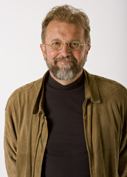
Menu:

Teaching Philosophy
How I Got This Way
“As I examine my years at Wesleyan I see that I am chiefly a facilitator of what I call “life-wide” learning. “Life-wide” is a term that I borrow from the late Campbell Loughmiller, the so-called “father of therapeutic camping.” Dr. Loughmiller was a cowboy from Texas who served in the merchant Marine during World War II and received a masters degree in social work from U.C. Berkeley in the mid 1940s. His own interesting and life-wide world view led him to conclusions about the meaning of education that were revolutionary in the late 1940s and are still radical and relevant today. School, he believed, should educate children for a life of curiosity, discovery and community. Teaching and learning should tap into those innate and mysterious forces that tie us to the natural world and one another. A love of life and an awe of the wonder and mystery of the world should permeate our teaching efforts. This is pedagogy-as-contagion. Campbell liked to start an “epidemic” of learning wherever he went. I had the great privilege of knowing this humble and wide-awake man for several years before he died in the late 1980s. His influence on my life is as strong now as when he was alive.
These three qualities, curiosity, discovery and community sum up my teaching objectives at Wesleyan. Because I believe that teaching is more facilitation than knowledge transmission I encourage my students to find what animates and directs their teaching selves, and then develop their own unique style of teaching from this self knowledge.”
(From my 3rd year review narrative, 2001)
I cannot think of any better explanation of why I am as I am as a college professor. “Life-wide” is still the term that best describes my philosophy of teaching and scholarship. I am still surprised and delighted when some new wonder leaps out at me, whether from the classroom, a discussion with colleagues or a walk in the woods. Indeed, I believe I am addicted to wonder, if that is possible. It’s just that the world is so interesting and people are so varied and unique, it seems that all one has to do is keep their eyes and ears and heart open each day and they will not be able to keep themselves from a life devoted to learning. I try to highlight this devotion in my classes by stressing the importance of the liberal arts in teacher preparation, i.e. that the best teachers are first of all educated persons who have a commitment to learning as a way of life and not just a means to a professional end. I use illustrations from my own classroom experience as well as those of other dedicated teachers.
My philosophy of teaching and learning is on-going and developmental, so when I am required to make a position statement about myself it always comes off like a stop-action photograph. One can certainly see some truth in a photograph but exactly what does it represent? Who knows. I do know that as a teacher (and person) I have come to believe more and more that students (and everyone else) must learn to make meaning out of life and learning with the materials at hand. It sounds cliché but it seems true that the experience of one’s life gives them a unique view of life. They will always make sense of the world through who they are becoming. As a teacher, the most important thing I can do is to find ways to facilitate this self-directedness into situations where students can discover its power.
One of the ways I have done this is through autobiographical writing assignments. The act of writing both clarifies and complicates and when one writes autobiographically a view of the self tends to emerge that is rich in complexity and illuminating moments. In EDU 201 Foundations of American Education, the students write stories of their own path toward professional teaching. They read these stories to each other in small groups where classmates give feedback on how best to tell them. In EDU 237 Geography for Educators students write autobiographically on how sense of place has helped form their adult identities. In EDU 350 Methods and Materials for Social Studies senior students work in writing groups to tell their own stories of teaching. In doing this they come to see how telling stories of their classroom experiences sheds light on their own emerging teaching self. Stories make the world and as a college professor I want to be a part of this creative act.
This approach to teacher education leads to a “life-wide” view of teaching because it identifies the teacher as curriculum. The classroom becomes a community of people because humanity and personal identity are at the center of curricular and instructional efforts.
Rev. 12.09